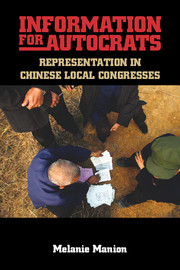Book contents
- Frontmatter
- Dedication
- Contents
- Tables and Figures
- Acknowledgments
- Introduction
- 1 Institutional Design
- 2 Selectoral Connection
- 3 Authoritarian Parochialism
- 4 Putative Principals
- 5 Independent Candidates
- Conclusion
- Appendix A Interviews and Surveys
- Appendix B Reliability Check on Delegate Self-Reports
- Appendix C Searching Independent Candidates on Sina Weibo
- Works Cited
- Index
- Miscellaneous Endmatter
4 - Putative Principals
Published online by Cambridge University Press: 05 December 2015
- Frontmatter
- Dedication
- Contents
- Tables and Figures
- Acknowledgments
- Introduction
- 1 Institutional Design
- 2 Selectoral Connection
- 3 Authoritarian Parochialism
- 4 Putative Principals
- 5 Independent Candidates
- Conclusion
- Appendix A Interviews and Surveys
- Appendix B Reliability Check on Delegate Self-Reports
- Appendix C Searching Independent Candidates on Sina Weibo
- Works Cited
- Index
- Miscellaneous Endmatter
Summary
As described in previous chapters, popular elections of local congresses now feature legally mandated contestation, secret ballots, and voter nomination of candidates. I argue that these new electoral arrangements, superimposed on the decades-old Communist Party personnel management system, create a structure of incentives such that party and government executives, with power over congress composition and allocation of local public goods, pay attention to congresses. More to the point, by implication, they pay attention to ordinary citizens—the “society” in the social stability that is now an imperative target for official career advancement. All the same, voters cannot really be characterized as veto players in the electoral process: local party committees have too much power to set the agenda. The street vendor quoted in Chapter 2 expressed the conventional wisdom that the electoral game is rigged, reflecting deep pessimism about the influence of ordinary Chinese. Similar to most conventional wisdom everywhere, the inference fails to capture nuances—but the perspective of the Chinese mass public is an important complement to the investigation in previous chapters. However well or poorly ordinary Chinese understand the nuances of party, government, and congressional power, their perspective has political resonance. It is also relevant to this book's assessment of local congressional representation as an institution. This chapter brings ordinary Chinese, the putative principals of congress delegates, directly into the study of representation. If, as argued in previous chapters, new and old institutionalized arrangements provide opportunities and incentives for local congress delegates to represent constituents, how and how much does the Chinese mass public see it this way?
To address this question, I turn to the surveys of 983 ordinary citizens across 46 voting districts in 23 townships of surveyed township congress delegates in Anhui, Hunan, and Zhejiang. All are rural localities, with a single village constituting a voting district in all but one instance—so the respondents in this sample of constituents are also all villagers. Because political engagement in the countryside generally lags behind that in urban China, this focus constitutes something of a hard test. At the same time, it offers a useful vantage point by which to consider the congresses: namely, popularly elected village committees, introduced widely in the late 1980s, about a decade after reinstatement of local congresses.
I begin in Section I with a brief discussion of village committees.
- Type
- Chapter
- Information
- Information for AutocratsRepresentation in Chinese Local Congresses, pp. 104 - 122Publisher: Cambridge University PressPrint publication year: 2015



